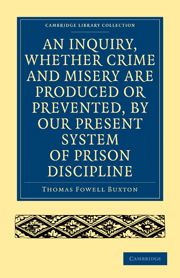An Inquiry, Whether Crime and Misery Are Produced or Prevented, by Our Present System of Prison Discipline
Published online by Cambridge University Press: 05 February 2012
Summary
Having thus entered into a detail of prisons–in London, in Middlesex, in Hertfordshire, and irt Surrey. I abstain from exhausting the patience of my reader by any further local description of this kind;–because I have the presumption to think that nothing more is necessary to establish the accuracy of each charge which I have made against our present system of prison discipline. Let no one, however, conclude, that those prisons in the vicinity of London, which are not mentioned, are free from every possible imputation. I could dispense with the Borough Compter, Tothill-fields, St. Albans, and Guildford; and yet establish my case beyond all contradiction. There are undoubtedly gradations in the inhumanity which is practised towards prisoners, and in (I may say) the exertions which are used to corrupt them; yet the same principle reigns very generally throughout. This will be best illustrated by a few facts: at the House of Correction at Chelmsford, I was advised by the jailer not to enter, as sickness was very prevalent: it appeared that one youth had died in the morning, of the small-pox, and one was (as it was supposed) dying of the Typhus Fever. The County jail at Kingston, is, in most respects, a counterpart of that of Guildford: the same want of work, clothing, cleanliness, and classification; and the same report from the jailer, of the encreasing depravity of the prisoners.
- Type
- Chapter
- Information
- An Inquiry, whether Crime and Misery are Produced or Prevented, by our Present System of Prison Discipline , pp. 46 - 72Publisher: Cambridge University PressPrint publication year: 2009First published in: 1818



